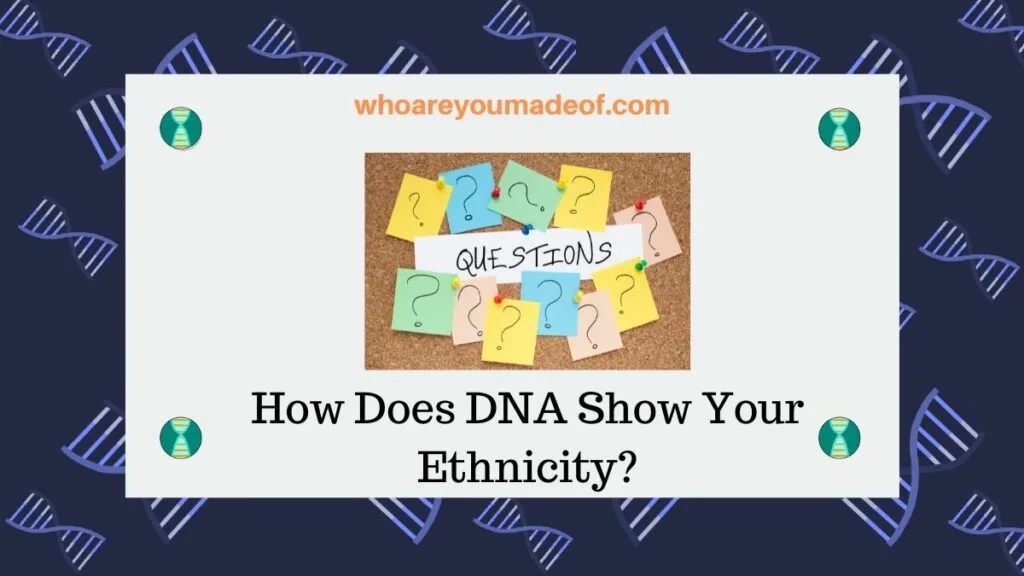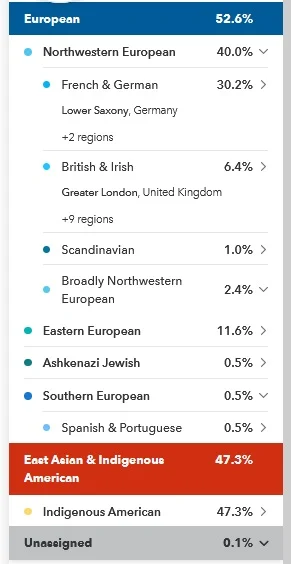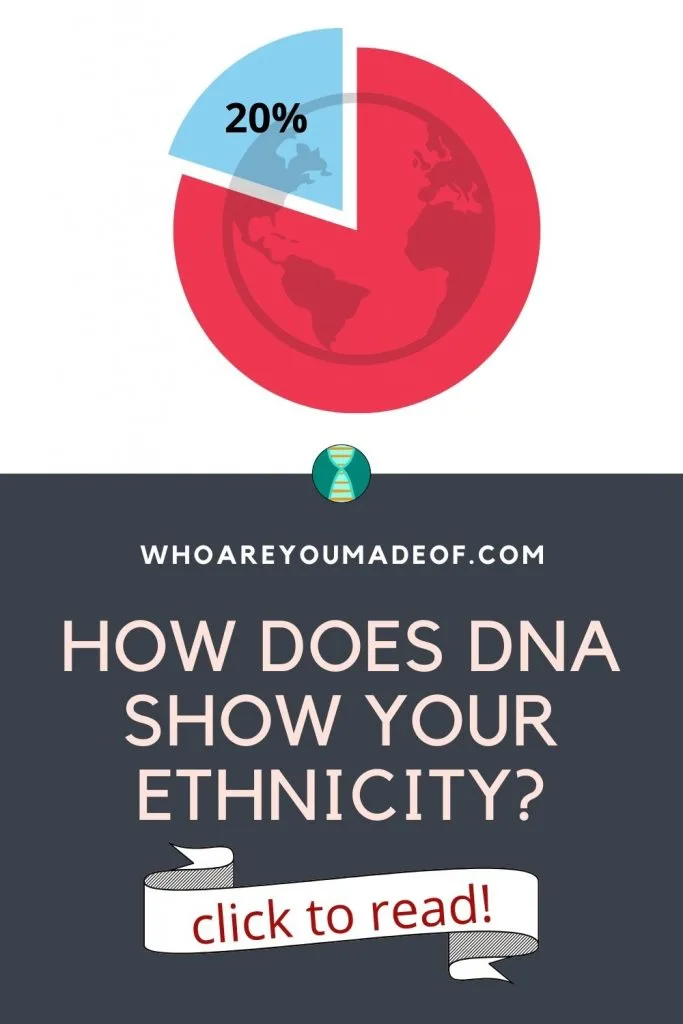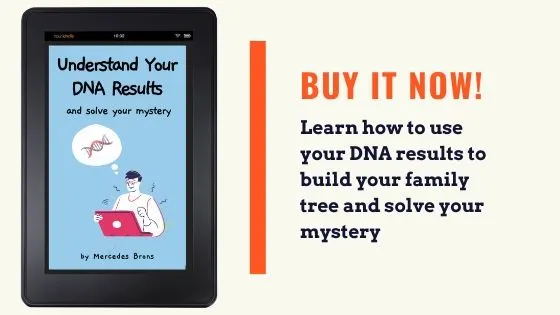Do you want to know how DNA shows your ethnicity? In this post, I'll explain the basics behind the science of DNA testing for ancestry, as well as:
- What is ethnicity in relation to DNA testing?
- How does DNA show your ethnicity?
- Will your ethnicity results match your family tree?
- Whether these results are accurate
- How to get a DNA test for ethnicity or ancestry

One of the most popular reasons for doing a DNA test is to find out our "ethnicity", or where our ancestors likely lived. These DNA tests can examine our DNA to find which regions of the world most closely match our genome, which can show us the likely ethnicities of our ancestors.
What is ethnicity?
Before we get started, it is important to discuss exactly what "ethnicity" really means, especially in the context of this discussion about DNA tests for ancestry.
Put simply, to have an ethnicity is to belong to a particular social group that shares cultures or traditions. It is possible to identify with multiple cultures and traditions at the same time, and share lots of other things, like language, culinary traditions, beliefs, and religion with members of the same ethnicity.
In terms of DNA testing for ancestry, DNA tests can closely examine our autosomal DNA to determine to which cultural groups our ancestors may have belonged. The results of these DNA tests are often called an ethnicity estimate or ancestry report.
Below is an example of an ancestry report from 23andMe:

How does DNA show your ethnicity?
DNA testing companies use complex algorithms based on information obtained from many thousands of individuals with deep ancestry in regions all around the world to determine
Have you heard that humans share about 99% of their DNA with chimpanzees and about 99.5% of their DNA with every other human?
Any two humans on earth, no matter where they are from, are far more alike than they are different. The way that our bodies work is identical, for all practical purposes.
Humans really ARE at least 99.5% identical to each other.
If this is true, how can DNA testing companies give us an ethnicity estimate based on our DNA? Scientists have figured out a way to determine where our ancestors probably lived by examining exceptionally small data points in our DNA.
DNA testing companies assemble reference panels for every region that their software tests for. Put simply, your DNA is compared against these reference panels to find which regions most closely match your DNA using a sophisticated algorithm.
The reference panels are formed from DNA information from thousands of people who can prove extensive ancestral connections (typically hundreds of years) to a particular part of the world. The verification process typically involves family tree research.
The reason that this process works is because the chromosomes of two people who share a common ancestral region will have more in common than chromosomes in someone whose ancestors came from a different region.
We all have two copies of each of our numbered chromosomes, with a total of 22 chromosomes in all. One copy of each chromosome came from our mother and father.
Within each chromosome are DNA segments that were inherited from our ancestors. Some are small and some are big, with larger segments coming from more recent ancestors.
When a smaller segment matches one region more closely, we will see a small percentage of that region show up on our results. If a large segment, or many large segments (or even multiple smaller segments) match a region, then we will see larger percentages from that region on our results.
Which ethnicity regions can show up on a DNA test?
The specific regions and the names chosen for those regions that might show up on your ethnicity results depend on the company that you choose to do your DNA test.
All regions of the world are represented in some way in all of the top five DNA testing companies (Ancestry DNA, 23andMe, Family Tree DNA, My Heritage DNA, and Living DNA).
This means that you will be able to learn if your DNA matches regions or countries within Africa, North and South America, Europe, Asia, and Australia.
Will your ethnicity results match your family tree?
Your ethnicity results from a DNA test will rarely exactly match your family tree. This is because we do not inherit DNA from all of our ancestors and our ancestors may have had ethnicity regions matching their DNA that we do not know about.
We inherit 50% of our DNA from our mother and 50% from our father, and the 50% that we get from each of them equals 50% of their DNA. The result of this is that both of our parents have DNA that didn't get passed down to us.
Since this occurs every generation (i.e. when your parents, grandparents, great-grandparents, etc) were conceived, "data" about our ancestors is lost over time. Some people describe this process as DNA being "washed out" over generations.
The ethnicity results from a DNA test can only show information from the DNA that you did inherit from your ancestors and can tell you nothing about the DNA that you didn't inherit.
Despite this surprising fact, we did inherit DNA from all of our recent ancestors and many of our distant ancestors. A DNA ethnicity test is a helpful way to get a snapshot that can help us understand where our family came from.
How to find your ethnicity with DNA
In order to find our what your DNA could reveal about your family's ancestry, you'll need to take a DNA test that offers an ethnicity estimate. Fortunately, all of the top DNA testing companies offer a DNA test for ethnicity and DNA matches.
You might enjoy the following post where I explain my favorite DNA testing strategy:
My two favorite companies for ethnicity (ancestry) estimates are 23andMe and Ancestry DNA. These two companies offer the most comprehensive ethnicity estimate, which is also called an "ancestry composition" estimate on 23andMe.
If you do order a test through one of the links below, I might earn a very small commission, which helps me support the work that I do on this website - so thank you.
Conclusion
I hope that this post has helped you understand more about DNA testing for ancestry and how DNA tests can show your ethnicity.
Have you taken a DNA test? What have you learned from your results? Join us in the discussion below!
Thanks for stopping by today.


